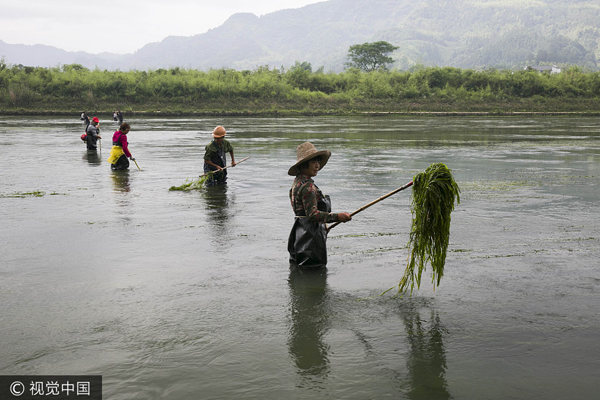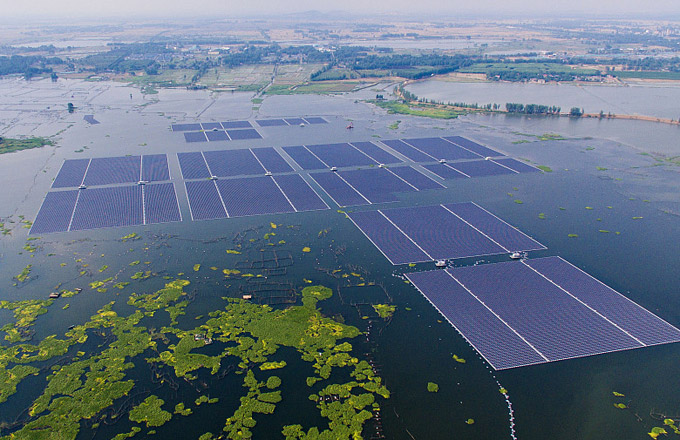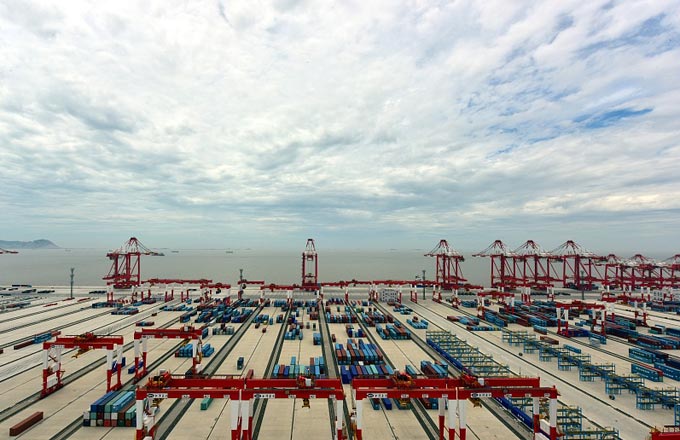Price of clean water 'a good deal'
 |
|
Workers clean weeds in the upper reaches of the Xin'an River in Huangshan, Anhui province. [Photo/VCG] |
Anhui, Zhejiang provinces have win-win arrangement in caring for Xin'an River
When the local government undertook a water quality project five years ago, Hu Chengjiu, a farmer in Huangshan, Anhui province, had no idea what a big difference it would make on his life.
Household rubbish is now strictly sorted, sanitary wastewater is properly processed and toxic pesticides have been replaced by low-toxicity ones to minimize environmental damage.
What looked at first like nothing but extra work has brought tangible benefits to the inhabitants of Banqiao township. The water in the nearby creek, which originates in mountain springs and fills Hu's fishpond, now meets drinking water standards.
Thanks to the springs' rich mineral elements, the fish living in it are thought to be more nutritious and sell for 10 times more than regular market price.
"The carp I raise taste finer and juicier," Hu said. "The answer lies in the water."
Hu is one of millions of people benefiting from a collaborative ecological preservation project between Anhui and Zhejiang provinces, through which the 373-kilometer Xin'an River passes.
According to the Ministry of Environmental Protection, water in about one-third of China's big rivers failed to meet drinking standards, even after processing, in 2015 when China published its first Water Pollution Prevention and Treatment Action Plan. The aim is to make at least 75 percent of water in major rivers clean by 2030.
The two-province success on the Xin'an River has considerable reference value for other efforts on big rivers to control water pollution and provide treatment.
The stream near Hu's village is on a part of the Xin'an River that has more than 680 tributaries within a drainage area of more than 11,000 square kilometers before entering the East China Sea via Zhejiang province.
Natural beauty
In the southern part of China's prosperous Yangtze River Delta, the area along the Xin'an River has long provided an abundance of fish and rice.
Agricultural development and convenient water transport has encouraged industrial and commercial growth, which has increased activity on the river.
In 1959, a hydroelectric power station was built downstream, forming Qiandao Lake, a 580-sq-km artificial lake with 1,078 islands covered with lush vegetation, 129 km west of Hangzhou, Zhejiang's capital.
- World's second big-span steel beam suspension bridge to open to traffic
- Chinese universities increase visibility in list of global top 500
- In Tibet, honesty and sincerity are never lost in translation
- Dongguan tycoon gets life sentence
- Girl who was fondled in Nanjing railway station was adopted, police say





















